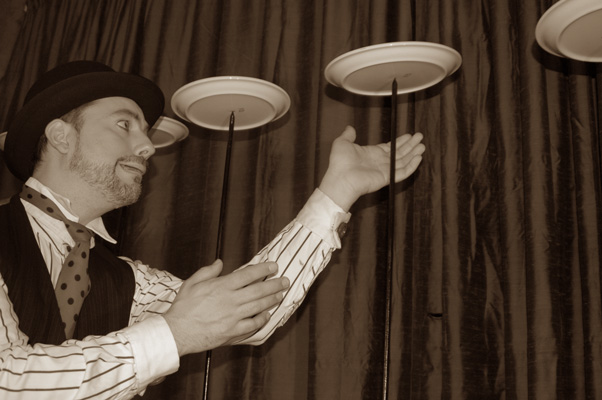Practice is good. Common sense tells us it’s necessary for progress and essential to maintain our skill. In my lessons, I rarely teach people how to play- it’s mostly about diagnosing what makes something difficult and then developing strategies and routines designed to break down the difficulty. I teach people how to practice. The playing comes fairly naturally after that, for the most part.
What do you think about when you’re practicing? What’s your goal? How do you know when you’ve succeeded? Here, let me give you an example.
I sight-read duets with most of my students. It’s a brutal experience for some of them- the ones who need it the most. You see, when you plow through something you’ve never read before with the general idea of making it to the end alongside someone else, there is a set of goals unique to this kind of practice. While we always want to sound good, the real priorities are something like:
1. count
2. listen
3. don’t freak out
…and the other stuff, I say screw it. Toss the bowings on the floor. Don’t get attached to playing the right notes. In a duet, the right note at the wrong time is still the wrong note with the added benefit of being in a different part of the music than the other person! Your scales and long tones are where you work on color, control and pitch. Your études manifest dexterity. Your ensemble music brings sophistication. Years of listening and playing earn you interpretation and poise.
So when you sit down to do whatever it is, I say have a goal and also maybe a set of non-goals. Stuff that can fall by the wayside because you’re at work on something else.
When you’re practicing for pure tone, maybe the metronome gets turned of until you can reliably produce an improved sound. Then turn the thing back on. Don’t even think of quoting me as someone who marginalizes that little ticking box of death and destruction. You know my thoughts on this. Emmy love metronome.
When you’re working on dexterity, maybe the tone goes off the rails a little. Set the metronome to a reasonable speed and get the thing on time. Cleanly. Obviously. Without anxiety. It may sound a little stupid or basic. Fine. Let it. Then, after the passage is nearly automated, allow your ears to once again search for the tone quality you’re after.
Just about all practice is good. Heck, I did everything wrong for ages and it still benefitted me. But especially for those of us who don’t have unlimited time and energy, setting priorities for practice can streamline the process and yield more meaningful results. Plus, it allows you to chart very specific progress without total perfection. A scritch-scratchy run through of your Suzuki piece that is perfectly aligned with the metronome is a blistering success if you’re working on your sense of time. Getting through Flight of The Bumble-Bee at 1/16=40 is the ultimate thrill if you want each note to ring like a bell. So focus. Pick something specific to work on and try not to be seduced by the other stuff until you’re in good shape all around.
It’s like one of those old-fashioned plate spinning acts. Maybe some aspects of your playing wobble while you’re paying attention to one piece of your technique, but before long, you’ll be able to get them all going at once with just a little concentration.



9 Responses
I love this post. It reminds me that no, I can’t do it all at once; I have to stop and break the task down, then sort out what I want to do with each bit.
It doesn’t feel speedy, but then, no one has yet developed a magic wand that makes me do things the right way first thing off the bat. In the end, it’s more efficient.
Good to read this. I teach piano and do exactly what you do. Nice to have confirmation.
As a musician I find practice can be frustrating if I’m in that “want it all now” mode. It just can’t be that way. Patience required.
I try. My brain rebels. It’s obvious that I make the most progress when I actually practice this way. I need someone with a large club to stand over me and whack me when I stray.
Absolutley well written. It is also perfect advice, I would like to add what I tell those I teach (anything) “fail ’till you succeed”.
There used to be a podcast by Rachel Barton Pine up about how to practice and plan out your practice time that was great — made a lot of the same suggestions plus others — but HER PODCAST HAS DISAPPEARED RAUGH …
Janis – you should contact her about it … that sounds like it would be of immense value to everyone.
I’ve got it … and I’ve left a remark on her FB about her vanished podcast, but she’s touring and just had a kid like five minutes ago or something, so she’s probably a bit booked. I really hope that podcast goes back up, because it’s brilliant. She has some interviews with everyone from the Vamoses to Uli Jon Roth and Mark Wood that are spectacular.
A God Send of a message.. i am a perfectionist which is a killer on practice time/efficiency….. and i am weaning myself off of that habit. This is just on step closer to My Goal 🙂
Awsome Emily.
Ha, I have the strength (weakness?) of NOT being a perfectionist, and the nonperfectionism is also a killer on practice time/efficiency, because i am often in the “want it all now” mode. I need to pretend to be a perfectionist for a while.
Emily just said this have-a-goal stuff in my lesson yesterday. Maybe this time I’ll only need to hear it twice (instead of a million times) before I really get it and start doing it.